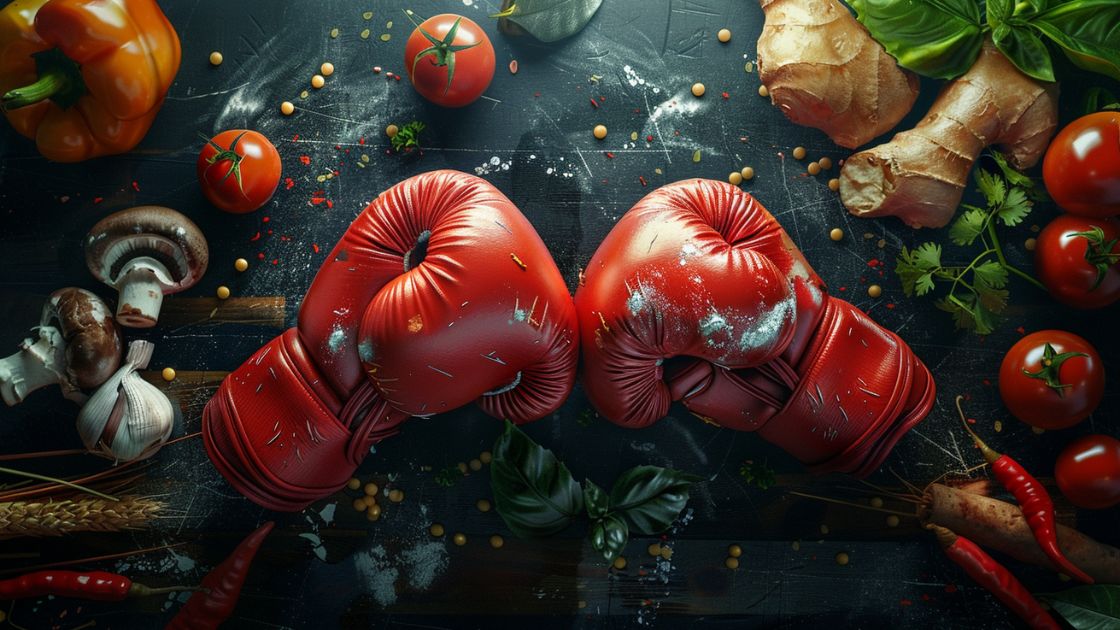Muay Thai, a physically demanding combat sport, requires athletes to maintain optimal physical condition to perform at their best. Nutrition plays a pivotal role in fueling the body, enhancing performance, and ensuring proper recovery. A well-balanced diet tailored for Muay Thai practitioners can significantly elevate stamina, strength, and overall endurance. It is crucial for athletes to understand how different nutrients impact their training and how they can optimize their diet to meet their specific needs.
This blog post aims to provide practical, evidence-based nutrition tips specifically designed for those engaged in Muay Thai training. From macronutrient distribution to hydration strategies and pre- and post-training meals, this guide will cover essential elements to help fighters achieve peak condition. Proper nutrition not only supports rigorous training regimes but also aids in maintaining ideal body composition, reducing injury risk, and speeding up recovery processes.
By understanding the significance of nutrition in Muay Thai, athletes can make informed dietary choices that contribute to their success in the ring. Whether you are a novice or a seasoned fighter, incorporating these dietary tips into your routine can bring significant improvements to your performance and overall health.
Understanding macronutrients and their roles is essential for anyone engaged in Muay Thai training. Macronutrients, comprising carbohydrates, proteins, and fats, serve as the cornerstone of an athlete’s diet, directly impacting energy levels, muscle repair, and overall performance.
Carbohydrates
Carbohydrates are often considered the primary fuel source for high-intensity activities like Muay Thai. They get converted into glucose, which is then stored in the muscles and liver as glycogen. During training sessions, your body taps into these glycogen reserves to provide the quick energy required for intense movements. Daily carbohydrate requirements can vary, but a general guideline for active individuals is to consume approximately 5 to 7 grams per kilogram of body weight. This ensures that your glycogen stores are adequately replenished, enabling sustained performance and preventing early fatigue.
Proteins
Proteins play a crucial role in muscle repair and recovery, making them indispensable for athletes. When you engage in strenuous physical activities like Muay Thai, muscle fibers undergo microscopic tears. Consuming sufficient protein facilitates the repair and rebuilding of these fibers, making them stronger and more resilient over time. For athletes, a daily protein intake of about 1.2 to 2.0 grams per kilogram of body weight is generally recommended. This amount supports not only muscle repair but also the overall development of lean muscle mass, crucial for enhancing physical performance.
Fats
Often misunderstood, dietary fats are an essential part of a balanced diet. They provide a concentrated source of energy, especially during longer training sessions or at lower intensities. Additionally, fats are vital for hormone production, including those involved in muscle growth and repair. Healthy fats should make up around 20-35% of your total daily caloric intake. Prioritize sources like avocados, nuts, seeds, and fish to ensure you’re getting a good mix of omega-3 and omega-6 fatty acids, which offer anti-inflammatory benefits that aid in recovery and injury prevention.
Balancing these macronutrients is key to optimal Muay Thai performance. A well-structured diet harmonizes the energy provision from carbohydrates, the muscle repair capabilities of proteins, and the sustaining, long-term energy and hormone regulation functions of fats. Tailoring your macronutrient intake to meet the demands of your training regimen will help you perform at your best and recover more efficiently.
Pre-Training Nutrition: What to Eat Before Hitting the Gym
Fueling the body before a Muay Thai training session is crucial for optimizing performance and reducing the risk of fatigue. Consuming the right pre-training meal can provide essential nutrients that sustain energy levels during high-intensity workouts. It is recommended to eat 2–3 hours before hitting the gym to allow adequate digestion and absorption of nutrients.
Carbohydrates should be the cornerstone of your pre-training nutrition. They serve as the primary fuel source for muscles during exercise. Opt for complex carbohydrates, such as whole grains, legumes, vegetables, and fruits, which provide a steady release of energy. For instance, a serving of brown rice with steamed vegetables or a whole grain sandwich with lean protein can be excellent choices. Additionally, incorporating moderate amounts of protein supports muscle repair and growth, which is vital for intense Muay Thai training regimes.
Lean protein sources, such as chicken breast, turkey, tofu, or low-fat Greek yogurt, can be paired with complex carbs to create balanced meals. These combinations not only enhance sustained energy levels but also provide essential amino acids needed for muscle recovery. Consuming a portion of protein alongside carbohydrates can also aid in stabilizing blood sugar levels, preventing energy slumps during training.
While it’s important to incorporate carbohydrates and protein, it’s advisable to keep fat intake on the lower end. High-fat foods take longer to digest, which could lead to discomfort during training. Foods like avocado, nuts, and seeds, although healthy, should be consumed in moderation before a workout.
Timing your pre-training meal is equally important. Eating a hearty meal 2–3 hours prior to training allows your body to digest and convert food into usable energy. For those with a tighter schedule, a smaller snack, such as a banana with a spoonful of peanut butter or a protein smoothie, can be consumed 30–60 minutes before training.
In summary, focusing on carbohydrate-rich meals with moderate protein and low fat before Muay Thai training ensures that the body is well-fueled for the physical demands of the sport. Thoughtful meal planning and timing can enhance performance, improve endurance, and support overall training goals.
Post-training nutrition plays a pivotal role in optimizing recovery and muscle repair for Muay Thai practitioners. After intense training sessions, the body is in a catabolic state, necessitating the immediate replenishment of glycogen stores, repair of muscle tissue, and reduction of inflammation. The post-training phase is crucial to restoring the body’s energy and promoting overall recovery, ensuring that athletes are prepared for subsequent training.
One of the primary focuses post-training is the intake of carbohydrates and protein. Carbohydrates are essential for replenishing glycogen stores depleted during training. A mixture of both simple and complex carbs is ideal, as they provide an immediate energy boost and sustained energy release. Examples include brown rice, quinoa, sweet potatoes, and whole-grain pasta.
Simultaneously, protein is vital for muscle repair and growth. Consuming high-quality protein sources can accelerate muscle tissue repair and mitigate muscle soreness. Lean meats such as chicken breast, turkey, and fish are excellent choices. For those seeking plant-based options, lentils, chickpeas, tofu, and tempeh are equally beneficial.
An optimal post-training meal may consist of grilled chicken breast served with a side of quinoa and steamed vegetables, providing a balanced intake of carbohydrates and protein. Alternatively, a meal comprising baked salmon, brown rice, and a mixed greens salad would serve the same purpose. For a quicker post-training snack, a smoothie made from Greek yogurt, frozen berries, and a banana not only replenishes glycogen stores but also offers a substantial protein boost.
Incorporating healthy fats can further support inflammation reduction. Foods like avocados, nuts, and seeds are rich in omega-3 fatty acids and are effective in this regard. Adding a handful of almonds to a post-training meal or incorporating avocado into a smoothie can enhance the anti-inflammatory effect.
In essence, a strategically balanced post-training nutrition plan can significantly impact recovery, enabling Muay Thai athletes to maintain peak performance and reduce the risk of injury over time.
Hydration: The Key to Sustained Performance
Hydration is a pivotal component in the realm of optimal Muay Thai training diet plans. Maintaining proper hydration levels before, during, and after training can significantly influence an athlete’s performance and recovery. Water is essential for various physiological processes, including temperature regulation, joint lubrication, and the transportation of nutrients and waste products. Thus, ensuring adequate hydration is critical for sustaining high levels of performance in Muay Thai training.
For most individuals, a general guideline is to consume at least eight 8-ounce glasses of water per day. However, for athletes engaged in intense or prolonged training sessions, water intake requirements can be substantially higher. It is advisable to drink water consistently throughout the day, starting with a glass upon waking and subsequently drinking small amounts as needed. During training, an athlete should aim to consume around 7-10 ounces of water every 10-20 minutes, keeping their body replenished and ready for peak performance.
Electrolytes play a crucial role in maintaining optimal hydration levels, especially during extended periods of physical exertion. Sweating results in the loss of not only water but also essential electrolytes such as sodium, potassium, and chloride. These electrolytes are vital for muscle function and overall fluid balance. To counteract this, athletes may require electrolyte-enhanced drinks, which can help restore the body’s balance and prevent the onset of dehydration.
Recognizing the signs of dehydration is essential to prevent any negative impact on performance. Common symptoms include dry mouth, dizziness, fatigue, muscle cramps, and dark-colored urine. Should any of these signs manifest, it is critical to replenish fluids immediately and take the necessary steps to restore hydration levels.
The benefits of optimal hydration extend beyond enhanced athletic performance. Proper hydration aids in quicker recovery post-training and reduces the risk of injuries associated with dehydration. By prioritizing hydration, athletes can ensure that they are maintaining the necessary conditions for peak performance and overall health.
Supplements: Are They Necessary?
The role of dietary supplements in a Muay Thai athlete’s diet is a topic of considerable interest and debate. Athletes often turn to supplements such as protein powders, branched-chain amino acids (BCAAs), creatine, and multivitamins to potentially enhance performance, recovery, and overall nutritional status. However, the necessity and efficacy of these supplements can vary significantly based on individual needs and dietary practices.
Protein powders are among the most popular supplements, frequently used to support muscle repair and growth, particularly after intense training sessions. While they offer a convenient protein source, whole foods like lean meats, dairy, and legumes can provide these nutrients along with additional vitamins and minerals, which are crucial for a well-rounded diet.
BCAAs, comprising leucine, isoleucine, and valine, are often touted for their ability to reduce muscle soreness and accelerate recovery. Though some studies suggest modest benefits, obtaining these amino acids through complete proteins in food sources, such as eggs, fish, and nuts, is generally as effective and can contribute to overall nutrient intake.
Creatine is another widely used supplement known for its potential to improve high-intensity exercise performance and increase muscle mass. It can be particularly beneficial for activities demanding short bursts of energy. However, similarly to other supplements, it’s vital to consider whether dietary sources, such as red meat and fish, can already meet these needs.
Multivitamins are often taken to fill nutritional gaps in the diet. However, the bioavailability of vitamins and minerals from supplements can be lower than that from food sources, making a balanced diet rich in fruits, vegetables, and whole grains the preferable option. Nevertheless, in cases of specific deficiencies or when dietary intake is insufficient, targeted supplementation may be necessary under professional guidance.
Ultimately, while supplements can offer benefits in certain situations, the priority should always be consuming a varied and balanced diet. Whole foods not only provide essential nutrients but also offer synergistic effects that supplements alone cannot replicate. Athletes should approach supplements as a potential adjunct to, rather than a replacement for, a nutrient-dense diet.
Creating a Personalized Nutrition Plan
Developing a personalized nutrition plan that aligns with your specific training needs, goals, and dietary preferences is crucial for optimal Muay Thai performance. The first step in personalizing your diet involves a thorough assessment of your individual goals. Are you aiming to increase muscle mass, enhance endurance, or cut weight? Each objective may require different macronutrient distributions, hence necessitating a tailored approach.
Meal planning is an essential component of maintaining dietary consistency. Draft a weekly meal schedule that includes a balance of carbohydrates, proteins, and fats to fuel your training sessions and promote recovery. Carbohydrates are particularly important for providing the energy needed for high-intensity Muay Thai workouts. Opt for complex carbs such as whole grains, fruits, and vegetables. Incorporate lean proteins like chicken, fish, and plant-based options to support muscle repair and growth. Healthy fats from sources like avocados, nuts, and olive oil are vital for overall body function.
Portion control is another key factor in creating an effective nutrition plan. It’s important to consume the right quantities to avoid over or under-eating, both of which can hamper your training progress. Utilizing smaller plates, measuring portions, or using meal-prepping containers can help manage portion sizes effectively.
Consistency in your dietary habits cannot be overemphasized. Adhering to your meal plan, even on rest days, helps to maintain energy levels and ensures that your body continuously receives the nutrients it needs for recovery and performance. Remember, consistency also reduces the risk of indulging in unhealthy eating habits which could negatively impact your training output.
Lastly, while general guidelines can be helpful, consulting with a nutritionist or dietitian can provide tailored advice that specifically meets your individual needs. These professionals can offer insights into nutrient timing, supplement recommendations, and can help you adjust your plan as you progress towards your goals.
Common Nutrition Pitfalls and How to Avoid Them
In the demanding world of Muay Thai, a properly balanced diet is essential for sustaining energy levels, optimizing performance, and promoting recovery. However, practitioners often fall into common nutrition traps that can hinder their progress. One frequent mistake is under-eating, which deprives the body of necessary nutrients and calories needed for rigorous training sessions. Athletes should aim to consume a diet rich in whole foods, including lean proteins, complex carbohydrates, and healthy fats to ensure they are fueling their bodies adequately.
Over-reliance on supplements is another prevalent issue. While supplements can be beneficial in filling dietary gaps, they should not replace whole foods. Whole foods provide a wide range of nutrients and fiber that supplements cannot replicate. Instead of focusing solely on protein powders or energy drinks, athletes should prioritize a varied and balanced diet that includes fruits, vegetables, whole grains, and lean meats. These will offer a comprehensive nutritional profile necessary for peak performance.
Consuming too much processed food is also a significant pitfall. Processed foods are typically high in unhealthy fats, sugars, and artificial additives, contributing to weight gain and sluggishness. Minimizing intake of processed snacks and fast foods, while opting for fresh, whole foods can significantly impact an athlete’s health and performance positively.
A practical approach to overcoming these challenges includes meal planning and preparation. By preparing meals in advance, practitioners can ensure a balanced intake of nutrients throughout the week, avoiding the convenience trap of processed foods. Additionally, it’s crucial to stay hydrated, as proper hydration supports overall health and aids in recovery. Water should be the primary drink of choice, complemented by natural sources like fruits and herbal teas.
Ultimately, maintaining a healthy, balanced diet tailored to the individual needs of Muay Thai practitioners is key. By avoiding these common nutritional pitfalls and adopting these practical solutions, athletes can enjoy sustained energy, improved performance, and long-term well-being in their Muay Thai journey.




